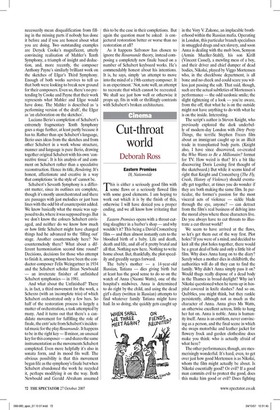Cut-throat world
Deborah Ross Eastern Promises 18, Nationwide This is either a seriously good film with some flaws or a seriously flawed film with some good elements. I am hoping to work out which it is by the finish of this, otherwise I will have denied you a proper ending, and we all know how irritating that is.
Eastern Promises opens with a throat-cutting slaughter in a barber's shop — and why wouldn't it? This being a David Cronenberg film — and then almost instantly cuts to the bloodied birth of a baby. Life and death, death and life, and all of it pretty brutal and all that. Nothing new here. Nothing to write home about. But, thankfully, the plot speedily and greedily surges forward.
The baby's mother — a 14-year-old Russian, Tatiana — dies giving birth but at least has the good sense to do so on the watch of Anna (Naomi Watts), one of the hospital's midwives. Anna is determined to do right by the child, and using the dead girl's diary (written in Russian) attempts to find whatever family Tatiana might have had. In so doing, she quickly gets caught up in the Vory V. Zakone, an implacable brotherhood within the Russian mafia. Operating in London, this particular branch specialises in smuggled drugs and sex slavery, and soon Anna is dealing with the mob boss, Semyon (Armin Mueller-Stahl), his son Kirill (Vincent Cassel), a mewling mess of a boy, and their driver and chief dumper of dead bodies, Nikolai, played by Viggo Mortensen who, in the cheekbone department, is all bone and no cheek and could scare you witless just passing the salt. That said, though, such are the actual subtleties of Mortensen's performance — the odd sardonic smile; the slight tightening of a look — you're aware, from the off, that what he is on the outside might not have anything to do with what he is on the inside. Interesting.
The script's author is Steven Knight, who previously explored the dark underbelly of modern-day London with Dirty Pretty Things, the terrific Stephen Frears film about an immigrant caught up in an illicit trade in transplanted body parts. (Knight also, I have since discovered, co-created the Who Wants to Be a Millionaire? format for TV. How weird is that? It's a bit like discovering Doris Lessing first thought of the skateboard.) But while it seems kind of right that Knight and Cronenberg (The Fly, Crash, History of Violence) should eventually get together, at times you do wonder if they are both making the same film In particular, the former's passion for the most visceral acts of violence — sickle blade through the eye, anyone? — can detract from the film's real business of delving into the moral abyss where these characters live. Do you always have to cut throats to illustrate a cut-throat world?
We seem to have arrived at the flaws, so let's get them out of the way first. Plot holes? If you were of a mind, and decided to knit all the plot holes together, there would be a great deal of hole and only a little bit of film. Why does Anna hang on to the diary? Surely when a mother dies in childbirth, the authorities will do all they can to find the family. Why didn't Anna simply pass it on? Would thugs really dispose of a dead body in the Thames in broad daylight? Why isn't Nikolai questioned when he turns up in hospital covered in knife slashes? And so on. Quibbles, you might think, but they rankle persistently, although not as much as the character of Anna. Anna gives Ms Watts, an otherwise excellent actress, little to hang her hat on. Anna is noble. Anna is humanity itself. Anna is an emblem, never convincing as a person, and the final scene in which she swaps motorbike and leather jacket for flowery frock and garden clothesline does make you think: who is actually afraid of what here?
The other performances, though, are mesmerisingly wonderful. It's hard, even, to get over just how good Mortensen is as Nikolai, whom the film might actually be about. Is Nikolai essentially good? Or evil? If a good man commits evil to protect the good, does this make him good or evil? Does fighting evil with evil result in some kind of moral mutation? What happens to moral mutation when it faces innocence? Does it devour or back away? Honestly, I couldn't say, but Mortensen as Nikolai manages, somehow, to float all these possibilities.
Does this film work as a crime thriller? You bet. Sure, you'll see a lot of it coming, but even so the edge of your seat may well be worn out by the finish. In fact, as with all the best thrillers, you might not even be aware that you're watching a thriller. I think, now it's come to it, I'm going to go for seriously good with some flaws.



































































 Previous page
Previous page